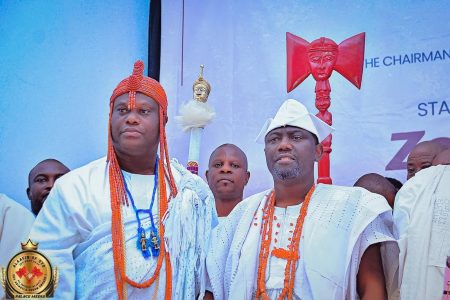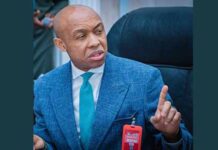Saturday, August 16, 2025, was set as a landmark date that would witness a unique event in the annals of Yoruba, Nigeria, if not African contemporary history. The Ooni of Ife, Oba Adeyeye Enita Ogunwusi, Ojaja II, had signed on to a programme tagged the unveiling of the Social Media Website, 2GEDA. I got the well-packaged invitation letters and made arrangements to attend. It was meant to push forward Nigeria’s version of Facebook and dictate the pace of local content in the growing social media space.
Commendably, the Ooni of Ife signed on to this project, and he is pushing it with all the vehemence at his disposal. He also chose Ilaji Hotel and Sports Resort, Akanra, Ibadan, as the venue to unveil the unique project. Ilaji, as the sprawling location is called, is run by a man who has also come to be known by that name. He is Jubril Dotun Sanusi, an engineer, a traditional holder of the Ajia Olubadan of Ibadanland and a man with several honourary chieftaincy titles across Yorubaland and the South-South.
Despite the fact that the date coincided with the House of Representatives by-election for Ibadan North Federal Constituency, held to replace the late Hon. Musiliu Olaide Akinremi (Jagaban), whose death created the opening, the event was well attended. Traditional rulers from all across Osun and Oyo States. You know that the Ooni doesn’t go to events empty-handed. His entourage was full, and the monarchs from Oyo State also joined in good numbers. All the who’s who among the Mogajis of Ibadanland were present, just as we had High chiefs, politicians, market men and women, artisans, and men from all walks of life thronging the Ilaji Resort space to celebrate with the Ooni and his birthday mate, Chief Jubril Dotun Sanusi. The nation’s security services were also well represented at the event, and that’s understandable. The mass audience, especially among youths and the business community, which the site would cater to, deserves that attention from security outfits, especially as the website being launched is projected to rival the popular Facebook and its variants, such as WeChat. So, we had the representative of the Chief of Army Staff, the GOC 2nd Mechanised Division, the Oyo State Commissioner of Police, a representative of the Ibadan Zone of the Economic and Financial Crimes Commission (EFCC), a representative of the Oyo State office of the Department of State Services (DSS) and the state’s command of the Nigeria Security and Civil Defence Corps (NSCDC), all in attendance. The representative of the EFCC took time out to lecture the gathering on the use of social media and the need for Nigerians to straighten the narratives about their country on such a platform.
There was no sign that the event, which had turned into a carnival of a sort, would trigger any controversy that we later witnessed hours after it closed. The Ooni of Ife, who made a speech before unveiling the www.2GEDA.net platform, spoke freely and gave no inkling of ruffling any feathers. He said he was qualified to be an Ibadan because he entered the city with his head (as the Yoruba would describe someone born and bred in a place). He declared that he was highly impressed by the love and care Dotun Sanusi exhibits towards his city of origin, adding that: “If you want to test him, just take a matter that affects Ibadan to him, you don’t need to know him, he will treat the matter.” He thereafter told the gathering that the time had come for Dotun Sanusi to officially receive the Okanlomo of Yorubaland title he had pronounced on him in 2020. The Royal Beagle boomed, and the trumpet sounded in affirmation of the Kabiyesi’s pronouncement, and the gathering chorused with applause, as well.
Everything went well, and the Ooni capped a good evening with a visit to Ilaji 91.9 FM station, located inside the Sports Resort, where he granted an interview. Hours after the historic launch of the first social media network out of Nigeria, news broke that the Alaafin of Oyo, Oba Abimbola Owoade, had issued a 48-hour ultimatum to the Ooni to withdraw the title he reaffirmed at Ilaji. That statement was, by all means, a needless interjection from the Alaafin’s palace. A dent we do not need on the white apparel of the www.2geda.net social media networking platform, something that portends good things can come out of Yorubaland and Nigeria.
In case you don’t know, social media, as presently constituted, is the true definition of what the Yoruba called aye lu jara, which the communication people describe as the world becoming a Global village. So, if a Nigerian is making an incursion into that world with local content, he or she deserves all the support and not the trail of needless bickering. The EC Innovations, in a January 2025 publication, submitted that social media is not just a global phenomenon; “it is also deeply localised.” The platform stated that different regions have their unique preferences on social media, which are influenced by cultural norms, language, and local regulations. In 2024, the site records that an estimated 5.17 billion people actively used social media, a 4.44 per cent rise from 2023. Globally, users are reckoned to spend at least 2 hours 12 minutes and sometimes 2 hours 18 minutes on social media daily. If you check the usage of social media in this country thus far, you will understand there is a void, which the Ooni initiative is trying to fill. Such an effort should not be blighted by any form of commotion, whether from political or traditional quarters.
As for the title conferred on Jubril Dotun Sanusi, we understand that the traditional award is already five years old and that it was pronounced during the reign of the departed Iku Baba Yeye, Alaafin Adeyemi. If that repository of history and a great custodian of tradition that he was did not object to the Okanlomo of Yorubaland title in his lifetime, why now? And there is no question that Dotun Sanusi does not merit the title. He is a traditional title holder in Ibadanland. And a holder of chieftaincy titles from Ile-Ife, across kingdoms in Yorubaland and Rivers State as well.
It is true that in Nigeria’s contemporary history, there are records of altercations between the Alaafin and the Ooni. There was a huge war over the permanent chairman of traditional rulers before Osun State was excised from the old Oyo State, but we can’t continue to revel in such inglorious history.
Societies must keep growing, just as life itself is never stagnant. Empires rise and fall, but the world remains a constant.
In all the history that we read, the Ooni stool is the custodian and the spiritual and religious essence of the Yoruba. He represents Oduduwa, the primogenitor of the Yoruba race. Ile-Ife is the undisputed source of the race. And then the Oyo Empire, which Alaafin superintended over, was established by Oranmiyan, a son of Oduduwa, who also became the Ooni at a stage. If the history is that intertwined, what is the essence of a supremacy war? Several Yoruba leaders have tried to intervene in the feud, all calling for a truce, but we all have to agree that traditional rulers should have nothing to do with acts tantamount to showboating. The drive towards peace and progress should be paramount to our traditional and political leaders. However, I’ve chosen to highlight certain realities regarding the unfolding development by quoting excerpts from a statement credited to the General Secretary of Yoruba Heritage Forum, Olufemi Aduwo, titled “Stop Distorting Yoruba History-Alaafin Warned Against Sparking Crisis Over Ooni’s Supremacy.”
He wrote: “The purported ultimatum issued by Oba Abimbola Owoade, the Alaáfin of Ọ̀yọ́, to Oba Adeyeye Enitan Ogunwusi, the Ooni of Ifẹ̀, concerning the conferment of a chieftaincy title upon Chief Dotun Sanusi is not only legally baseless but historically unsustainable. I am unaware of any subsisting court judgement, if such even exists, that grants the Alaáfin supremacy over the Ooni in matters of traditional authority or chieftaincy recognition. Any reliance on such a phantom judgment constitutes a grave error and a distortion of history.
“It must be emphasised that the historical Ọ̀yọ́ Empire, celebrated though it was, never at any time encompassed the entirety of Yorùbáland. Scholarly consensus, including Samuel Johnson in The History of the Yorubas (1921), establishes that Old Ọ̀yọ́ was, at its zenith, a coalition of certain territories whose power was often contested and ultimately fragmented. Its authority was largely confined to a collection of towns and villages in the savannah belt, never extending to the whole of Yorubaland. The Alaáfin’s political and military supremacy was therefore limited, and any chieftaincy title he confers, even the once-glorified but now ceremonial Are-Onakakanfo, holds force only within Ọ̀yọ́ town and immediate environs. Such titles cannot, by law or custom, impose authority over Ifẹ̀, the cradle of the Yoruba people.
“Colonial records consistently reinforce this distinction. British reports, including the Intelligence Report on Ife Division (1930s), recognised the Ooni as the spiritual father of the Yoruba race, stating: “Ife is recognised throughout Yorubaland as the source from which all the Yoruba people sprang. The Ooni is regarded as the spiritual father of the race. “Similarly, A.B. Ellis noted in 1894: “The Yorubas unanimously admit that their kingship and institutions took rise at Ife, whence their rulers trace their authority.”
“By contrast, the Alaafin was described as head of the Oyo Empire, a political and military authority whose reach, even at its height, was geographically limited and temporal in nature. The 1920s Intelligence Report on Oyo stated: “The Alaafin’s authority, though now much diminished, was once the political overlordship of much of Yorubaland. His supremacy was temporal and not spiritual.”
“Colonial administration formalised these distinctions between Native Authorities in the 1916–1930s era: while each Oba had authority within their districts, the Ooni was never reduced to a local king of Ife alone; his prestige as the father of the Yoruba race was explicitly recognised. By contrast, the Alaafin’s jurisdiction was largely confined to Oyo town and its immediate environs.
“It is, therefore, patently wrong for the Alaafin to assert that the Ooni’s powers are limited to certain Local Government Areas. Traditional authority in Yorubaland is not coterminous with modern political boundaries. The Ooni of Ifẹ̀ embodies not just the kingship of Ifẹ̀ township but the spiritual primacy and ancestral custodianship of the entire Yoruba race, a status no political subdivision can diminish. Historical and colonial records alike affirm that the Oyo Empire, Yorubaland, and the Ooni’s spiritual authority transcended temporal boundaries.
…”The Yoruba nation, already burdened with insecurity, economic instability, and generational aspirations, cannot afford another chieftaincy-fuelled crisis. Let it be clearly understood that any attempt to provoke strife under the guise of supremacy will be resisted both by law and by the collective will of the Yoruba people.”







